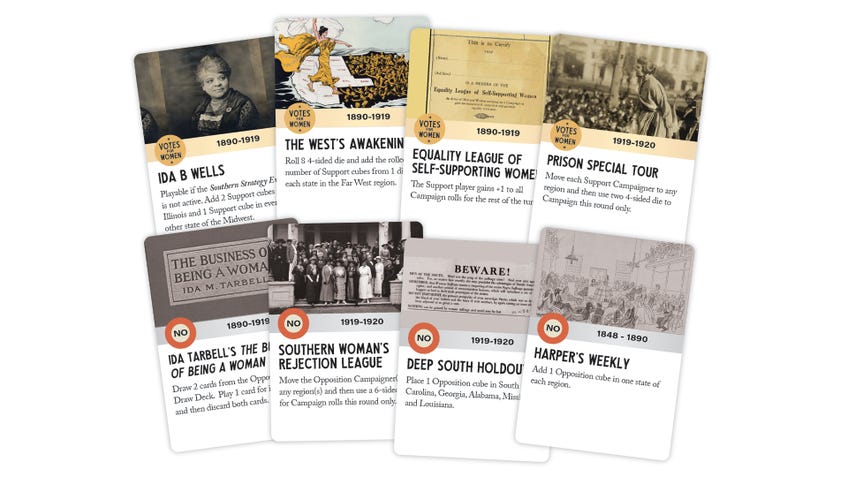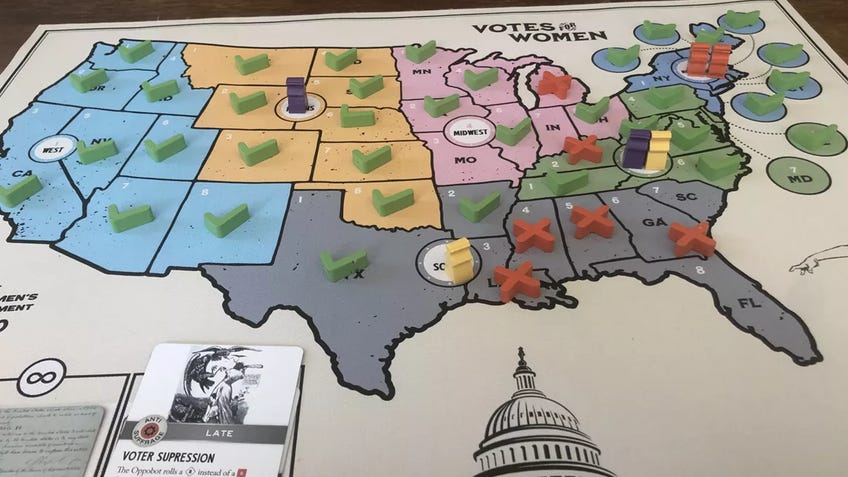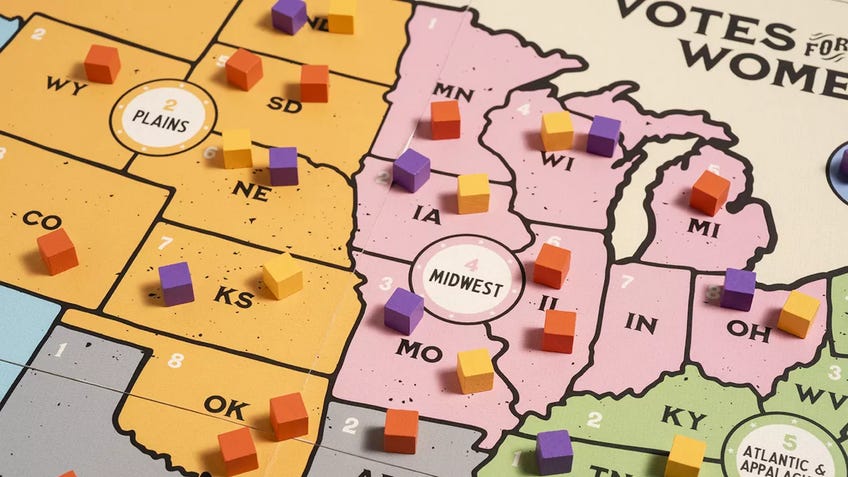Votes for Women turns the frustrating fight for women’s rights into a vital board game lesson in history - and the present
History repeats itself.
Votes for Women is a board game about an historical event that keeps repeating itself: the fight for women’s rights.
Set in the US between the years of 1848 and 1920, Votes for Women follows the events leading up to the ratification of the Nineteenth Amendment, which enabled certain women - namely white women - to vote. The board game sees one player controlling the campaign for the Suffragettes and the other the campaign for the opposition, with the game positing that the events in this timeline could end differently from their historical counterparts: with the Nineteenth Amendment potentially failing to pass.
Though the amendment did pass and American women have gained the right to vote - although it would take several more decades to include African-American, Asian-American, Hispanic-American and Native-American women - when it comes to women’s civil rights, it feels like that crucial progress is currently being eroded. Since the Roe v Wade ruling was overturned in 2022, several US states including Alabama, Missouri, South Dakota and Mississippi have enacted a near-total ban on abortion, meaning that anyone seeking to gain essential reproductive care in those states are forced to seek it elsewhere or not receive it at all.
Content warning: the next paragraph discusses rape, sexual assault, abuse and pregnancy.
This has reportedly resulted in an estimated 64,000 pregnancies occurring as a result of rape in US states that have a near-total ban on abortion between July 1st 2022 and January 1st 2024. Of these cases, an estimated 59,000 pregnancies have taken place in states where there are absolutely no exemptions that enable abortion procedures, even when they’re the result of rape. We are currently living in a world where some US citizens are being forced to undergo pregnancies that they may otherwise wish to terminate.
All the cards in Votes for Women reference specific events, organisations, tactics and people who were involved in the ratification of the Nineteenth Amendment.
Though abortion rights are far from being only a women’s issue, with the reproductive rights of trans men and non-binary people also being stripped away across the US, they are an essential cornerstone of women’s liberation. Having the right to choose whether or not to carry a pregnancy to term enables women to be in control of their own bodies, to decide when and if they want to have children - something that anti-abortionists want to strip away. These people won’t stop at abortion either, with Republicans such as house speaker Mike Johnson calling for an end to no-fault divorce laws in the US, which could trap vulnerable women in abusive marriages with no way out.

All this is to say that the civil rights of women in the US are being openly stripped away, with organisations such as the National Abortion Federation, Center for Reproductive Rights and Reproductive Freedom for All rallying people to reinstate the right for abortion across the country.
This struggle for women’s rights is echoed in Votes for Women, with players utilising their respective cards and resources to influence as many US states as possible to support their respective side. (Unless players are working together as the Suffragettes in the board game’s co-op mode.) Whilst the Suffragettes are seeking to get the Nineteenth Amendment to congress and obtain the support of 36 US states, the opposition are working to either stop the bill from reaching congress or, if that fails, securing the support of 13 states.
All of this results in an uphill battle for the Suffragette player, with every minor victory having the potential to be ripped away from them.
Each round sees players alternating turns, with the option to use their cards in a variety of ways: using their abilities, exchanging them to spread support from their campaigners or using them to gain more buttons, which can be used to re-roll dice and bid for powerful strategy cards. All the cards in Votes for Women reference specific events, organisations, tactics and people who were involved in the ratification of the Nineteenth Amendment - such as Susan B Anthony, Woodrow Wilson and Sojourner Truth. Though this is a great way for players to learn about the history of women’s suffrage in the US, actually playing Votes for Women is an even better method.
Both decks in Votes for Women - which contain entirely different cards - are set up in a specific manner that reflects the timeline of events leading up to the ratification of the Nineteenth Amendment, with certain cards appearing further down and, thus, being drawn during later rounds. Whereas the opposition gains access to cards that enable them to seize control of certain states early on, the Suffragette player will likely draw cards that have much less of an impact - only granting them one or two supporters in a handful of states. The game’s decks are also geared towards giving each side supporters in specific areas of the country, with the Suffragettes leaning more towards the West Coast and North East and the opposition having a stronghold in the South and parts of the Atlantic and Appalachia area - which roughly reflects those regions’ history in voting on women’s rights.
The Suffragette player’s primary concern, at least initially, is getting the amendment in front of congress, which requires them to either play cards that progress them along the congress track or by using their campaigners to lobby, rolling six-sided dice in the hopes of getting at least one six. If they fail to fill the track before the final round then they immediately lose, but they’ll still need to work at gaining supporters in the meantime if they want to have a chance at passing the amendment. All the while, the opposition is using their cards to block the amendment’s progress to congress, suppress support for women’s suffrage in as many states as they can and gain their own supporters.
The fight for women’s rights in certain areas of the US and within certain parts of its political structure feels like an unbalanced match
All of this results in an uphill battle for the Suffragette player, with every minor victory having the potential to be ripped away from them as soon as the opposition has the will and the means to do so. Even if the tables do turn - with the Suffragette deck featuring more effective cards designed for the later rounds - and the pro-suffrage player does get the amendment to congress, they still have to utilise every tool available to secure and retain support.

Successfully gaining at least four supporters in a state once the amendment has reached congress automatically flips that state towards the supported side. If neither side has acquired the number of supported states needed to win by the end of the sixth round, the outcome of Votes for Women is decided by a series of dice rolls for every undecided state. These rolls can be augmented through previously played cards, the number of supporters each side has in the state and spending buttons for rerolls. This stage of the game is an undeniably tense one, with the element of luck meaning that some states have the potential to go either way on support.
The early game favouring the opposition and the late game favouring the Suffragettes is a good reflection of how civil rights battles often progress, with there usually being an initially strong pushback before things giveaway to inevitable change. Likewise, the struggle for the Suffragettes to make headway and the aspect of random chance deciding some outcomes, also mirrors elements of historical and current civil rights politics - with the fight for women’s rights in certain areas of the US and within certain parts of its political structure feeling like an unbalanced match sometimes decided by aspects out of our control.
Though I won my first playthrough of Votes for Women as the Suffragettes, next time I play as that side I may not. So it goes that when we have to play the game for women’s civil rights for real - which is disappointingly often. We don’t always win. However, there are plenty of us who are more than willing to give it another shot and try to emerge victorious next time, even when the rules of the game are initially against us: this is a game we all must keep playing.
Publisher Fort Circle Games provided Dicebreaker with a copy of Votes for Women
Buy Votes for Women from publisher Fort Circle Games.


